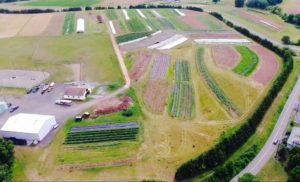Stormwater Management, A Farmer’s Perspective
Article and Photos by Jess Niederer
On this rainy 2017 day, I am just fresh back in the office after a drive past a whole lot of farms. Many farms drain their surface water out to the road, and in these saturated conditions, you can usually see how well the farmers’ erosion prevention measures are working. You know when you should wince? It’s when that run-off in the ditches looks like chocolate milk. I saw a fair share of chocolate milk run-off out there today. Why should that bother us? It puts silt in the streams (smothers a healthy benthic zone ecology), it puts nutrients in the streams, it puts any present agricultural chemicals in the streams, and it takes topsoil (which takes 100 year/inch to form) off the field.
And someone, yes, a human, is gonna have to drink that water after some imperfect filtration process. Humans not your thing? Well, first the fishes will have to live in it. Scales don’t strum your heartstrings? Alright…the adorable baby foxes will have to drink it too. Not really an animal fan at all? OK, the nutrients may cause imbalanced plant growth in the ocean, and you’ll get a lot of seaweed on you during your beach day. If you don’t think of yourself as an environmentalist, don’t worry about it, I’m not trying to convince you. But it’s a guarantee that something you care about is negatively affected when a farm’s topsoil ends up in the creek.

Contour Farming at Chickadee Creek Farm
GOOD NEWS though. The water running off our farm was clear. It wasn’t always like that, we had to work and change things up to protect the water. Through filter strips, contour farming, and being conscientious about when we till, we all win.
Jess Niederer is the owner of Chickadee Creek Farm, a certified organic and certified transitional organic* vegetable, flower and herb farm in Hopewell Valley, NJ. In 2016 she was named the National Outstanding Young Farmer by the Outstanding Farmers of America. Candidates are nominated from all across the country, and a panel of judges selects winners based on progress in their agricultural career, soil and water conservation, and service to their community, state, and nation.
